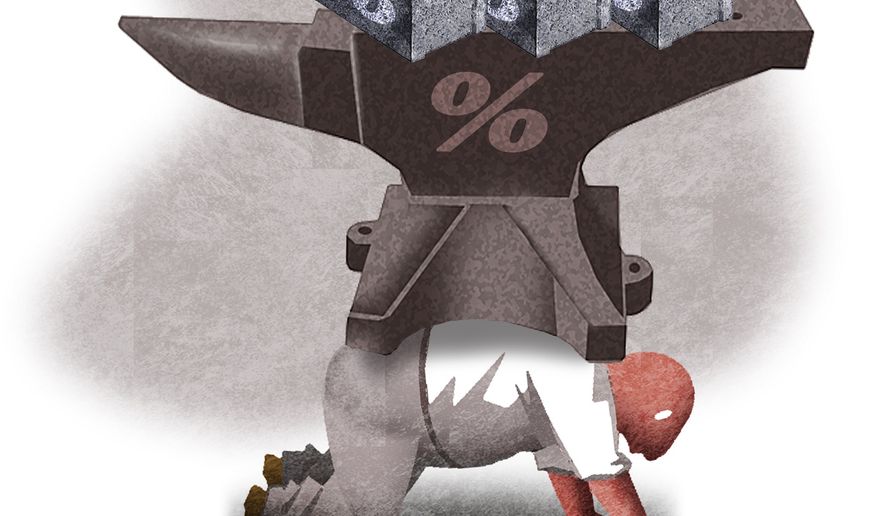OPINION:
Survey results this election cycle have repeatedly indicated that voters consistently identify inflation and cost of living as the most important issue facing the United States. That is, of course, a consequence of excessive federal spending over the last few years, which has resulted in the worst inflation in 40 years, crushing family budgets.
Unfortunately, this economic damage has been exacerbated by many state governments — uniformly controlled by Democrats — which have chosen this very dark economic moment to raise taxes. In contrast, states with Republican-controlled legislatures have reduced taxes and pursued policies that have put money back into the pockets of their constituents.
How are these competing approaches working out? Let’s start out West.
In Colorado, the Democratic legislature established a host of new fees to fund the state’s transportation system. They increased the gas tax. They raised property taxes. With this sort of careless attitude toward the economic situation of its citizens, it is perhaps not surprising that Colorado has one of the highest rates of inflation in the nation at 15.6%.
In neighboring Utah, by comparison, the Republican legislature passed legislation that delivered a $200 million tax cut to help citizens improve their lives. It can’t be an accident that Utah has maintained one of the lowest unemployment rates in the country all year.
In Oregon, the Democrats in the legislature raised the sales tax, raised the gas tax, and hiked taxes on businesses. Portland has seen the third worst economic recovery from COVID-19 of all U.S. cities, and Oregon continues to have one of the highest rates of inflation in the country.
Next door in Idaho, the Republican legislature reduced taxes by $600 million. Again, perhaps not coincidentally, Idaho has seen an economic boom and recovered over 150% of jobs lost during COVID-19.
In Nevada, Democrats repealed a scheduled reduction to the state’s payroll tax. Republicans opposed the move on grounds that extending the tax amounted to a tax increase that would require a two-thirds majority vote under the state’s constitution. Happily, they were right, and the legislation was struck down by the Nevada Supreme Court.
The legislature also extended a transaction fee for the Department of Motor Vehicles and allowed counties to impose a 5-cent tax on diesel fuel, either through an ordinance passed by a governing body such as the board or by a ballot question. It will amaze you to learn that Nevada has one of the highest rates of inflation in the country at 14.9%.
How about Arizona, its neighbor to the south? There, the Republican legislature reduced taxes by $2 billion.
Meanwhile, back in New York, where the economic recovery has been among the worst in the country, the Democratic legislature increased new employment taxes by billions. New York has the highest unemployment rate in America, along with the highest tax burden in America.
If you are one of those who remain in the Empire State, it might be time to think about making a change and voting for Lee Zeldin for governor.
In neighboring Pennsylvania, the Republican legislature lowered the state’s 9.99% corporate net income tax rate to 6.99% by 2025, and created a pathway for the rate to be lowered to 5.99% beginning in 2026 (if the Commonwealth exceeds revenue projections). When that happens, Pennsylvania will end up having the eighth lowest corporate tax rate in the country.
In Maine, Democrats in the legislature attempted to pass legislation to tax pet food and health insurance premiums, and add 40 cents a gallon to the gas tax.
In contrast, the Republican legislature in New Hampshire passed $171 million in tax relief for working families and small businesses, cut taxes for retirees, and reduced property taxes by $100 million.
As you think about voting in these elections, it is important to remember that the economy is not a feature of the world that we discover or encounter like a mountain range or gravity. Rather, the economy is something we create by our individual choices. Those who voted for the Democrats in 2020 were not misled by that party’s candidates and their preferred policies. Those voters chose a path that has led us to lose $8 trillion of value in the stock market, experience extraordinarily high inflation, and have the value of everyone’s paycheck reduced.
Be mindful and intentional with your voting decisions at all levels.
• Michael McKenna, a columnist for The Washington Times, co-hosts “The Unregulated Podcast.” He was most recently a deputy assistant to the president and deputy director of the Office of Legislative Affairs at the White House.
Correction: In a previous version of the column, the tax cut in Utah was listed incorrectly. It was a $200 million tax cut.




Please read our comment policy before commenting.